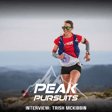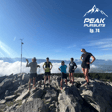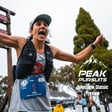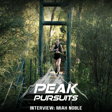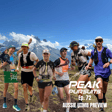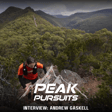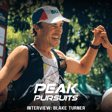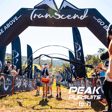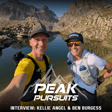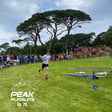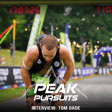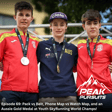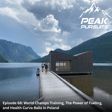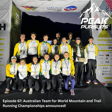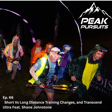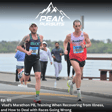Become a Creator today!Start creating today - Share your story with the world!
Start for free
00:00:00
00:00:01

Beth McKenzie Post Race Interview: 2025 UTA 100km
We're joined by the UTA 100km 2nd place Beth McKenzie to chat about her eventful leadup to the race and then how the race unfolded. Beth shares her strategy, key learnings, and what is coming up in the season ahead!
***Don’t forget, use code PPP at https://bix-hydration.myshopify.com/en-au for 20% off Bix products, exclusive to PPP listeners!***
Thanks for tuning in to Peak Pursuits! Connect with us on Instagram @peakpursuits.pod to share your thoughts, questions, and your own trail stories. Until next time, keep hitting the trails and chasing those peak pursuits!
Music from #Uppbeat (free for Creators!): https://uppbeat.io/t/soundroll/tropicana License code: MFJHTO0ZMVHA84WI
Transcript
Introduction and Race Recovery
00:00:17
Speaker
Hey guys, it's Jess here from the Peak for Suits podcast and today I'm joined by a very well-known name in the trail running scene. ah Welcome Beth McKenzie, fresh off your second place at UTA 100. How are you going?
00:00:32
Speaker
Thanks so much, Jess. Yeah, no, I'm going good. It's almost, well, I guess it's exactly a week on now. I'd be just finishing up in about an hour this time a week ago and yeah, feeling good, recovering well. Thanks for having me on.
00:00:46
Speaker
And thank you for taking the time to chat today. um So how has the recovery gone? Because I saw on your socials that you had a bit of an injury in the lead up and it wasn't yeah it wasn't the most ideal build, but yeah, how are you feeling now?
00:01:03
Speaker
Yeah, i luckily, I guess we can get into it a little later with the build and things like that, but I was really injured and I was really worried about how that would sort of play out at 50, 60, 70, 80K of the race.
00:01:18
Speaker
um And the thing that was bothering me the most on race day was like an ankle, like a posterior tib tendon thing, which is just a tendon tear. Yeah. not a huge deal, but can be pretty painful.
00:01:29
Speaker
And luckily during the race, like I think all the adrenaline and I had taped it up and all that stuff, I felt it, but it really wasn't that bad. And then the next day or two, it wasn't, that bad. And then on day three, it just really started hurting. So I'm just trying to continue to deal with that, talk with my physio.
00:01:48
Speaker
I finally bought some more stable, supportive shoes. I've known, like I always wear alpha flies in races and silly stuff like that. And that's probably why I have ankle injuries.
00:01:59
Speaker
So I'm trying to be a little bit more sensible in the build back.
Running Background and Transition
00:02:02
Speaker
um Yeah. And just But as far as like the rest of my body, my quads were really smashed the first few days as I'm sure everybody's were. And especially because I hadn't done a lot of the training that I would normally do is like a lot of the quad pounding type of preparation. I hadn't done any of that.
00:02:19
Speaker
So super nervous about that. It was okay on race day, but after the race, I definitely paid for it. um But yeah, back running. I did ended up doing 21 K today, cheering on friends at the Newsome marathon and,
00:02:32
Speaker
yeah just back into it that's amazing yeah that's incredible how fast you can recover from 100k um i did the 50 i feel like i'm still recovering oh how was it do yeah it was good it was my first 50 so um wow yeah it was fun it's such a tough finish like up the further stairs so hard so hard there's nothing like it really there really isn't yeah um So I guess we haven't had you on the show before. And usually with our guests, like we like to sort of introduce them to the listeners and like talk a bit about how you got into trail running. um
00:03:09
Speaker
So yeah, fire away. the What's sort of got you into trail running and what drew you to the sport? Yeah, I'll have to It's funny because I'm 45 now, so I've got really long history. So you definitely don't want all of it.
00:03:24
Speaker
But the most recent history is um I was a professional triathlete throughout my 30s and did a lot of Ironman really long races. So I was really used to doing sort of a 9 to 10-hour race, and I loved that. That's where I really thrived. And also in Ironman, I was – okay at swimming, slightly better at biking, and then pretty good on the run.
00:03:50
Speaker
So after my husband and I retired from Ironman Racing, we, well, first we started our business, which is Win Republic, where we make um A lot of triathlon and cycling wear, but also a lot of running and trail running gear.
00:04:08
Speaker
And we wanted to, you know, I was just still really into sports and pushing myself and still wanting to find my edges and where I could go. but I couldn't balance like a 30 hour training week anymore.
00:04:22
Speaker
Also with two kids. So running a business, two young kids that are, you know, toddler and, um a baby at the time. And just, it was too much, but I really wanted to keep going.
Olympic Trials and Trail Racing
00:04:35
Speaker
So at first, um, when we retired from triathlon, I just started seeing what I could do in the marathon. Cause that was a fun goal for me. Um, and I did marathoning for about a year or two with Some success for for my age, I guess. So like when I was 42, 43, ran few 240 marathons, like 237, 238.
00:04:54
Speaker
i ran a few sub two forty marathons um like two thirty seven two thirty eight a few times i was trying to get just under ah to make the u olympic trials qualification standard. So it's different than in Australia, but anyway.
00:05:11
Speaker
um yeah And I just missed it by like 47 seconds, a million different times. um It was so fun. Like I was really, really good at running 237 or 238, but I could not run 236.
00:05:22
Speaker
And eventually I was just like, you know what? Like I don't, I didn't feel like I was getting any faster, but I still had limits. I wanted to push and I was like, I'm going to try a 50K. um And I did one in Nusa and I loved it. And I've always done trail running. actually did trail running a long time before I ever did a triathlon. So I did some Southern California trail series back in 2008.
00:05:42
Speaker
two thousand and eight um And that's sort of how I got my start. i Always loved to trail and Xterra and things like that. So it was easy for me to just say, hey, let's try this and did a 50K, did another 50K. And then eventually, think, yeah, last year when i turned 44, I was like, yeah, i want to try a hundred k so i did TerraWara was my first trail Yep.
00:06:07
Speaker
Oh, wow. Okay. didn't realize you were so new to the 100k distance. I know. And it's like, I love it. It's such a great distance. It's so much fun. And the first time I was really just going out there to see, like, just to test my limits and stuff. And I was lucky in that Ruth Croft was in the race at Tarawera and she's obviously one of the very best in the world. So I was like, well, let me see where I'm at yeah compared to that. And, you know, ah I was a good, whatever, 20 minutes behind, but I still was like, that was, that was really good. That's amazing. Yeah. And I was second place in that race behind Ruth.
00:06:39
Speaker
yeah And that's what made me want to sign up for UTA last year. um yeah and do my first UTA because in that first 100K, I felt like I learned so much and I had really good fitness, but like a lot of the execution was just, I think I spent at the end of the day, my husband like did some math and he's like, you spent 12 more minutes in aid stations than Ruth did.
00:07:03
Speaker
And I was like, what? He's like, yeah, like she didn't sit down. She didn't, you know, change shoes. She didn't do all this stuff. Like, yeah You know, so I was like, okay, I'm going to clean up my aid stations. I'm going to do this. going to do that. So i was really motivated to just see, like, just find that time on the table for UTA last year.
Training and Family Balance
00:07:21
Speaker
And yeah, so that's how I got into it. That's awesome. um And I've also seen that, like, you've done a bit of high rocks. Is that something you're taking seriously as well? Or is it a bit of fun? Yeah.
00:07:33
Speaker
High rocks for me is a bit of fun. i have really enjoyed getting more into the strength training and stuff. I think strength training is super important, especially as you're getting older in your 30s and 40s, making sure like you have the strong bones, but just also strong everything. So I also do a lot of Pilates for that.
00:07:53
Speaker
um But my husband, once he retired from triathlon, our journeys were very different. So Luke, Luke McKenzie is my husband. He won lots of Ironmans back in his day. He was a career triathlete. So he was a triathlete for over 20 years.
00:08:08
Speaker
And then when he retired, he didn't want, he didn't have any more athletic pursuits. He just wanted to, you know, be it normal be a normal person, whereas I was still like, go, go, go. i want some more finish lines.
00:08:19
Speaker
And so he didn't have anything for a while. And I think it really impacted his happiness and overall wellbeing and mental health even. And um once he heard about High Rocks, that was something that like you can do Rocks in you know, seven to 10 hours a week. You're not spending tons of time training, but you get a lot of out of it and you still have the running.
00:08:38
Speaker
so anyway, he wanted to do that. And he asked me to be a mixed doubles partner with him. um And I'm a good mixed doubles partner because most of it is running really. So we did that and we qualified for the High Rocks World Championships.
00:08:53
Speaker
And so now we've done two High Rockses. And in two weeks now, we're going to Chicago for the High Rocks World Championships. where um Luke's big goal for us, he would be to like win our age group because we're, you know, 40 to 49. Yeah, which is funny. and So that's sort of the big goal right now. And so I'm trying to shift focus a little bit just to give that some attention for the next couple weeks.
00:09:19
Speaker
um But it's a lot of fun. I love it. And I like being able to spend more time training with Luke and doing that kind of thing. So Yeah, I don't take it too seriously, but it really makes him happy. So I enjoy doing it together.
00:09:29
Speaker
That's awesome. And I totally agree. Like strength training is so important and it all like translates to becoming a better and more resilient runner. And um it's it's so cool that you've just done something like for fun and now you're going to world champs and it's like a family, like getting your family involved. It's it's really cool.
00:09:48
Speaker
Yeah. Yeah. And like, say what's your typical week? looking like at the moment. So like how many Ks... Are you doing how many strength and higher ox sessions? And how are you balancing that all while being a mom?
UTA 100 Experience
00:10:03
Speaker
Yeah, good question. Not always balancing it very well, but it works. um So typically not before UTA because I found out like six weeks before, seven weeks before UTA that I had like two stress fractures.
00:10:16
Speaker
um But prior to that, my normal training volume, like say leading to into TerraWare this year, which I also did, is like anywhere from like 125 to 145K per week, typically like 130 to 140 kilometers.
00:10:32
Speaker
um A lot of that, probably half and half trail and road running um just for convenience out of the house and also treadmill, you know, with kids, treadmill is really great.
00:10:43
Speaker
um And I do a lot of uphill treadmill running. My coach, Meg Roach, is over in the US s and she's really well known for those amazing treadmill uphill runs. So I do do quite a bit of running, but that's about, I think it's like 10 or 11 hours a week of running. So as a former triathlete, to me, it doesn't seem like that much.
00:11:02
Speaker
um And then on top of that, each day I do do a strength thing. So I'll do like three hot Pilates classes a week. And then I'll two like high rock space strength training sessions with Luke. So I do do, Oh, I don't know where these balloons are coming from on our, I know you guys can't see us, but we've got some, you know, balloon graphics. They're beautiful.
00:11:23
Speaker
Um, anyway, so we do two high rocks strength training sessions a week, but I don't do any running during those. Most High Rocks athletes actually do running during those sessions, but I'm like, I think I get enough running outside of it. yeah And I know about yeah a big thing in High Rocks is like compromised running because you have these workout stations like ski erg or lunges or burpees.
00:11:45
Speaker
And then in between those, you do a 1K run. each time. So people practice like running on tired legs, um, which like we did for years as triathletes. So I don't, I don't find that that hard. And even just in trail running, obviously when you're running four hours, it's, you know, you're running on tired legs anyway. So Yeah.
00:12:06
Speaker
That's my training mix. It's a big training mix. And then with kids, like Luke and I often switch off in the mornings, but we are just, we're really good about going to bed early because we just love that. We love it. Like we go to bed with the kids pretty much. We read to them and then I read for maybe half an hour in bed and then I'm asleep by 8, 8.30.
00:12:25
Speaker
Luke and I are usually up at 4.30 and then we might train in some way until 6.30, then we get the kids ready to go to school, get them off to school, then we go to work at Wynn, but it's great, we make our own hours. So I often like we'll leave on a lunch break and go and do a sauna, um something like that. I think the heat training is really important and recovery. So I do a lot of that because again, like I'm, as a maturing athlete, that stuff has become really vital in um everything I do. So I do a lot of recovery stuff.
00:13:00
Speaker
And then in the afternoon, I might squeeze in another workout while my kids are at dance. um They do a lot of dance, but it's kind of good for my training schedule. And that's it. We always wrap it up by 4.30 or 5 and have an early dinner and family time. It's amazing. Serious life goals.
00:13:15
Speaker
yeah Yeah, it all ends up working. We also, though, i mean, I'd be silly if I said like, oh, it's, you know, I do everything. I have so much support. And part of the reason we moved to Noosa is because Luke's family lives here and his parents are retired and they're amazing with our girls.
00:13:33
Speaker
They have helped us with them since they were both born when we were both racing professional triathlon. And so they've had a routine every, um since the girls were like two or three, where every Friday night the girls go to Nanny and Pa's house and they have like a sleepover and a disco and whatever they do. And then Saturday mornings, Luke and I do long training sessions. So it's It's great for the kids. The grandparents, I think, love it as well.
00:13:59
Speaker
yeah And then we get to get some like big volume training on a set Saturday, which is nice. So we're lucky. We've got a
Family Support and Race Strategy
00:14:05
Speaker
lot of support. It's so good to have that support. um So I saw at UTA you brought the whole family down it was a bit a family affair at the crew aid stations. That was pretty cool. um Did the girls enjoy it?
00:14:19
Speaker
Yeah, it was so funny. Like they often when they come to races and stuff or they've been to races before, they're like, hurry up. Can this be done now? Can I go get a snack? Can we do this?
00:14:30
Speaker
um So I was really nervous about how it was going to go the whole day with Luke having to make sure all the crewing was going well, but the kids pulling him in a different direction. um But they were amazing. And it was the opposite. They got so into it.
00:14:44
Speaker
um They were watching it online while they'd go from place to place. The girls all each had their roles, like Wynn was helping wipe mud off of my legs marlo was trying to help with gels and bars and they just got super invested and they loved it and it was it was a really great day i was so glad they could come they don't always come to our races um just for school and logistical reasons and so it was really nice i told them they're they're now a permanent part of the crew oh that's so cute i love that um So yeah, let's jump into the race recap now. um Keen to hear how you found this year compared to last year. um Yeah, how was the build up and what like what sort of goals did you have going into UTA hundred this year?
00:15:29
Speaker
Yeah, cool. um so the buildup I mentioned, I did. So about eight weeks out, I had done Noosa Ultra Trail 50K. um And I actually ended up DNFing. I had had some calf pain that was really bothering me.
00:15:44
Speaker
And then also a week before the race, I had a really bad fall on my face. I still have a scar. um I fell on the trails and had a mild concussion. And it was, ah yeah, it was pretty intense.
00:15:56
Speaker
But um I still wanted to do Nusa Ultra Trail because it was a local race. And, you know, there's always that pull of wanting to do that. And I thought it would be great training for UTA. So I still tried to do it, but my calf was really bothering me.
00:16:09
Speaker
And then I ended up DNFing at like thirty six k which is Very rare for me. I think I've only DNF'd including triathlons like two or three races in my life. Like I finished 20 Ironmans in my Ironman career. ah Yeah.
00:16:24
Speaker
And ah out of 21. And that was because I double punctured and all kinds of stuff. So I do usually like to finish what I started, but I think my body knew in that race that like something wasn't right and I just needed to – to stop.
00:16:38
Speaker
So a few days later, like my calf was still bothering me. And so I've got a great team and they were like, let's just get an MRI and check it out. And it turned out I had a left tibia plateau stress fracture, which I didn't even feel.
00:16:52
Speaker
and then a right tibia stress reaction, and then this posterior tibialis, tendinitis, and tear. um So the stress fractures were the things that were concerning, because obviously you can't run on broken bones.
00:17:06
Speaker
um And the stress reaction, they were like, yeah, that might be like four weeks or something, but the stress fracture, like you're going to rest that a long time. yeah But I had not felt it at all. So it was really strange. And they just said, okay, let's just kind of go by feel. So I took the next basically four weeks off running. And this is seven weeks out of UTA.
00:17:25
Speaker
So I didn't run for a month. um But this is like where being a triathlete really comes into handy. I never once like was in despair of like, I can't run, i can't do this. I was like, okay, what can I do?
00:17:39
Speaker
And what I could do was a lot. And I knew I could stay aerobically fit. So I did like 500K a week on my Zwift bike. ah So just doing indoor cycling.
00:17:51
Speaker
I did a lot of the high rocks type of ergs. So like the skier and the rower. And I was able to still do Pilates. And I was also able to still do like walk, hike up and down stairs. So we have got this. okay ah Yeah, we've got a big.
00:18:05
Speaker
stair, not a staircase, but a lot of 214 stairs that are not far from my house. And I had a great girlfriend who would just walk up and down i'm with me every day. So I was actually, i put in like a couple of huge volume weeks. It was just zero running. So it was like 20 hours so of stuff.
00:18:23
Speaker
Just none of it was running, but I knew from triathlon that that's, that keeps you fit. So I thought if I was able to run a few weeks before the race, that there might be a chance um And so about three weeks before the race, I was able to start running a little bit.
00:18:38
Speaker
And I kept thinking it would just, you know, the neck, I was waiting for the other shoe to drop every day. Like tomorrow I'm going feel some, some shin pain tomorrow. This is going to flare up, but it just
Future Plans and Race Management
00:18:49
Speaker
didn't happen. And like, I guess my, my, I don't think I like was a super fast healer or something, even though I did, like I did hyperbaric oxygen chamber. I did red light therapy, lot of,
00:19:00
Speaker
sauna, just anything I could. i think some of it was just, I bet once they imaged it, I'd already had them for like a few weeks. So I think maybe they were like on the way to healing already. That's the only thing I can yeah think of. Cause otherwise like typically in four weeks, a stress fracture is not going to heal.
00:19:16
Speaker
But anyway, we started running and just went by pain and I had zero pain. So we're like, let's keep going. I did, think I made it up to one the week before the race. I think I ran like 110 or K or something like that, which was a lot.
00:19:31
Speaker
Um, And I just thought, okay, well, let's give it a shot. So I just didn't, I was very thankful to make the start line part of it. You know what? Actually, this is kind of funny, but I probably would have thrown in the towel if I hadn't like five days before I got the um MRI.
00:19:50
Speaker
I booked the accommodation um near Katoomba in Blackheath. And everything's so expensive around the race. And it was like, yeah I think it was like, it was 2,500 US dollars. So was about like 4,000 Australian dollars. My Airbnb account is in whatever. don't know. It was very expensive and it was non-refundable. So was like, no matter what we're going, like we're bringing the kids to the blue Mountains.
00:20:13
Speaker
We have plane tickets already. We're going, like if I can be on the start line, I'm going to be there. But, you know, had that accommodation been refundable, I'm pretty sure I would not have lined up at that race, which is pretty funny.
00:20:24
Speaker
Yeah. Um, but anyway, so I got to the start line and I was just going to be thankful to make it to the finish line. I knew I wouldn't have quite the last year. I had a flawless buildup. Like everything went really well the whole time. I had a great build, no niggles, no injuries.
00:20:45
Speaker
I knew I was in great shape for me. So I knew i was just going to be the same person, just like a notch down. And I just hope there wasn't any big catastrophes during the race. So yeah um yeah, I was like, I knew that Eve would be great. My friend Anna McKenna had told me about Eve and she's like, she's a great runner. And there's several, like Emily is amazing as well.
00:21:05
Speaker
And um Julia Grant, I actually knew from my triathlon days. So I knew all these women were going to be really strong. I knew Lucy had just come back from America. So that could be, could go either way, but um I was just going to run my race.
00:21:19
Speaker
And also... Um, I was like, it was the day before i was due to get my period, which I am like terrible racing on that day, just awful normally. And I was like, well, I'm probably only going to have 75% anyway. So maybe that's just where I am. Um, but.
00:21:39
Speaker
Full credit to Eve. Eve was super, super strong on the day. I don't know if I would have even beat her at my best. um She, I like probably could have given it a little bit more, but I don't think like she was really amazing. And as soon as she caught me, like I did go out fast as I always do for 5k, she caught me and I was just like, I don't have anything to stay with her. I'm going to run my own race.
00:22:03
Speaker
She'll go ahead and then we'll see what happens. i Like, you know, there's always, they could falter. But if she didn't falter, I knew she was going to win the race. She was super strong. She looked happy, comfortable. i was not comfortable. i was not feeling great the first three hours of the race, which is not normal for me at all. I usually feel great.
00:22:22
Speaker
I think some of that was just like the hormones and stuff. So i was like, all right, this is just going to be a long day. But I think once I dialed it back, I actually came good. I really enjoyed the middle, like six hours of the race. It was really muddy. It was lot of fun.
00:22:36
Speaker
um I really prepared myself mentally for last year. I struggled so much and lost like eight minutes, I think, to Lucy in the section between Katoomba Aquatic Center and Queen Vic Hospital. Because, well, as you know from doing this year, you're just going down and up and down and up and down and up and stairs, stairs, stairs.
00:22:57
Speaker
But the reason that I like was so frustrated and lost so much time last year is because when you look at the map, It doesn't look like there's any massive elevation. So I was thinking, oh, this is going to be like the uplifting part of the race. It's going to be easy. I'm going to see my crew a lot. And it ended up being the opposite for me.
00:23:15
Speaker
So this year I went into that section with a much better mindset. I knew what it was going to be like. I knew it was going to be slow and I was just going to just... get it done. And i actually had a much better time in that section of the race than I did last year.
00:23:28
Speaker
um and I think I pretty much held the gap to Eve through then. um I was about seven minutes back through Queen Vic hospital at like 78K. And then the last 22K, unsurprisingly, with my buildup, I definitely fell apart a little bit.
00:23:44
Speaker
I was able to run down the ca Kadamba descent, but it was, ah like even in my head, I was like remembering some videos from last year when I was just flying down there. And this year was like, that is not flying. Yeah.
00:23:56
Speaker
but I was getting it done. it was fine. And then the trudge back up, I think was a lot slower than last year too, but I haven't looked at splits or anything yet. I was just like, i'm going to get it done.
00:24:06
Speaker
I'm not going to get caught by third place, or at least I'm going to try not to. I'm going to get to, and I didn't know that they were going to have my kids there at the finish line and that crossed the line with them. So that was so special and so amazing.
00:24:18
Speaker
And yeah, it was, it was the best day I could have hoped for. i I'm so happy, I'm so proud of myself for getting to the start line and then the finish. um Of course, a couple of days after you're like, oh, if I could only do this, but you know what? I gave it what I had on the day and I'm happy with that.
00:24:35
Speaker
And Eve was was amazing. Yeah, no, it was such a good race. Like given everything that happened in the buildup, like it was incredible.
Community and Future Ambitions
00:24:43
Speaker
And like, that was the course the same as last year?
00:24:47
Speaker
Oh, that was another thing. So I went about 30 minutes slower than last year. But I'm pretty sure the course ran about 15 minutes slower than last year, 15 to 20 minutes slower.
00:24:58
Speaker
um yeah Just based on like Eve's time, I think she would have been at least comparable to like what I did last year. And she was about 15, she was 15 minutes slower than I was last year. Yeah. I don't think that that was because she was slower. I think it was because the course was slower. We we we ended up going down giant steps, which we didn't last year. That was a big surprise me. was whoa, whoa, where are we going? That was hectic. I know. And then they make you just go all the way back up. So i think the mud also impacted some of the runnable sections just with speed and some of the stairs. It was just a little bit more clunky.
00:25:30
Speaker
ah So I do think the course was slower, but then also I was slower. So was sort of that compound interest thing. yeah do you think like um you've gotten like more confident on the sort of like running downstairs as you've done more of it ah like to know but then today i actually re-watched um this they had some camera on me when i was going down the giant steps and it is absolutely it's actually embarrassing i
00:26:01
Speaker
I was like, I really thought I was doing better than that. But it looks like just like an average grandma going down the the steps. I was like, what is this? I don't really know. I mean, we don't have anything like that. So I don't know yeah how I could build technique doing that.
00:26:15
Speaker
yeah you Do you guys have stuff like that in Canberra? Not really. Like, yeah, I struggled down there as well. um I come from a road running background as well. So I find all that stuff just like oh son for oh so unfamiliar. um And yeah everyone was flying past me in that section. i was like, how are you running so fast down here?
00:26:34
Speaker
I'm sure like they were all, I was losing time to everyone, but I have tried to build technical skills over the past couple of years, but I'm definitely not at the level of like, um, ah yeah but in Tarawera this year i was like, I was leading through like 50 K and then Ruth pulled away from me.
00:26:53
Speaker
And then at 55 K we were going down this gnarly, like, you know, when they just cut a trail into the side of a hill and it's not actual trail, it's just what they had to do to link up two trails for the race.
00:27:05
Speaker
And it was just a mess. And I'm like sidestepping down, not thinking much of it. All of a sudden, Caitlin Fielder comes up on me, bombs down like we are in an absolutely different sport. Like she looked amazing. And it was just like, oh, like i was like in my head, like that's how it's supposed to look, you know? And I was just like.
00:27:23
Speaker
glad nobody else saw me, but it was, I was so impressed. So maybe Caitlin can give me, Caitlin, if you're listening, can I have some lessons one day? Give us some tips, please. She's so good. Yeah. I'm so impressed. Like she was amazing. So I'd love to build more of those skills.
00:27:37
Speaker
If I do CCC this year, I think I'm going to try to get out to um the Alps a few weeks early and just practice some of that stuff, learn how to use poles. I've never used poles in trail running before, things like that.
00:27:49
Speaker
So Yeah, cool. Yeah, that's what i was going to ask next. So you've got High Rocks World Champs and then you're looking at CCC? Yeah, I am signed up for CCC. But of course, during UTA, I retired a few more times. And I was like, you know what, this is a great one to end on. I'm so proud of my effort. My family's here. This is this is it. I'm done. I'm not going to do CCC. It's a lot of time investment. And, um you know, for me,
00:28:15
Speaker
i like Our kids are at the age where I can't necessarily take them out of school for a long period of time anymore. And they have they're both, as I said, very serious about dance. So they have ballet exams and things. So I can't just whip them off to Europe for the winter.
00:28:29
Speaker
However, for me to have the best race that I... think that I'm capable of, I need to do that. I need to have a good preparation. um i can't just be running around the little like muddy hills in Noosa. It's not going to work.
00:28:41
Speaker
um but So so the so the plan prior to UTA was that I was going to go over three weeks before the race on my own. And, um, my husband was going to hold down the fort at home and I was just going have a training camp at altitude and, you know, really focus on that for a little bit. But I had a lot of second thoughts during the race. I was like, why would I spend time away from my kids?
00:29:03
Speaker
I don't need to do this. It's, you know, selfish. Um, you know, it's hard. You're pulled in a lot of directions as a mom and you want to but fulfill your own goals. But then you also want to make sure you're there for your kids. And I've never left them for that amount of time before. So I don't know. We'll see. I changed a little bit after the race when they were all, the kids were like, mom, you have to do CCC. And I was like, yeah, but you can't come. And they're like, oh, well, we'll watch online. I'm like, yeah, but I'm not going to be like at the front. So you might not see me that time.
00:29:32
Speaker
Yeah. Anyway, so it's, you know, it's challenging. But I think a week on now, i'm like, yep, this might be my by one and only time to, say, try to be competitive at CCC. So why not give it a shot?
00:29:46
Speaker
So I think I'll do Yeah, that's awesome. That's so exciting.
Conclusion and Reflections
00:29:49
Speaker
Thanks. Cool. Actually, I wanted to circle back to, um you mentioned that yeah UTA fell sort of like the day after your period or the day before was supposed which is the worst day. Yeah, yeah the worst timing.
00:30:05
Speaker
um Do you have any advice for women like when that's coming? Because I've definitely yeah had that with a few races and like you get the anxiety when you sort of know it's the worst timing. You're like,
00:30:16
Speaker
oh I can't avoid like feeling like shit do you have any advice yeah and you don't want to like blame it on that either and say oh I just was flat because of this because it seems like an excuse but it's not really it's a real thing and actually the day after the race when when I was contemplating CCC I looked in my little because gar my Garmin checks my cycle and everything and I'm like when is CCC but but I'm in the clear it's like you know week two or week three so And my mine's pretty regular. So I was like, okay, oh would be fine.
00:30:43
Speaker
um yeah But as far as advice, like i think I think you do have to be a little bit more kind to yourself on the day and go into it knowing you may not be able to do like those really, really high-end efforts. But in trail running, I was telling myself, I'm like, that doesn't really matter. I don't need to be going at 100% at any time during this race.
00:31:04
Speaker
If I can be going at 85%, that's great. But also think, um yeah but also i think So I did do some research in the in the week before the race. And um you've probably heard of like Dr. Stacey Sims. She's really great with a lot of just advice for women in all stages of life, um exercise scientists and physiologists and female researcher.
00:31:26
Speaker
And she actually has like some recommendations for, you know, if you're going to race a few days before you get your period. And she has a recommendation for like a PMS stack, which is like,
00:31:38
Speaker
Um, it's like magnesium, zinc, uh, aspirin, baby aspirin and, uh, omega-3s, I think, I think those are the four things, but you can like, you can Google Stacey Sims, PMS stack or whatever.
00:31:52
Speaker
Um, but that, yeah you know, definitely I try to take as few supplements as I can. Um, and anything that you want to take is always should be like informed sport tested uh, ah certified for, you know, that it's banned substance free. So I was only comfortable adding in some magnesium that, that week. Cause I take pillar magnesium and that's all, um, certified and then baby aspirin. Cause that's like, i don't know. i was like, that can't hurt. I'll just try.
00:32:18
Speaker
Yeah. So, um, but yeah, I'd be curious to see if like, cause I had a recommendation from a very, very smart person to try that. So, um, That's something that you could do. I didn't take any omega-3s or anything, but I totally would if if I was, you know.
00:32:35
Speaker
So look into that. And then, yeah, just be kind to yourself and know that some people actually perform very well, like the day before their period. Some people, yeah for me, it's i think everybody's very different. So don't assume you're like anybody else.
00:32:50
Speaker
For me, if it's like even day one or day two of my period, I'm great. It's like no issue at all. But it's just that period, that two to three days right before where I just feel yeah um But not everyone's like that.
00:33:02
Speaker
So make sure to just make your own assessments. Be kind to yourself. And then, yeah, do some Googling, but always Google with care. ye yeah yeah no very good advice there and um yeah i was also wanting to get your thoughts on um like as someone that's so experienced at like competing and like like race week um how do you tackle like race anxiety and like now that you've done a few hundred k's and you've done really well like I'm guessing you sort of build that expectation, um a little bit.
00:33:36
Speaker
Um, like how do you manage that expectation, um, on your performance and just making sure that like you're getting enough sleep and all that thing, like all that stuff in the, in the lead up to the race?
00:33:49
Speaker
Yeah. Um, that's actually interesting. You said sleep because for me, that's the biggest one. And if I don't sleep well, that's actually a big source of anxiety for me. So I just really try to set everything everything up the way, like the best possible to get good sleep, like the whole week before a race.
00:34:07
Speaker
Traveling before ah race can be hard. If I'm traveling more than two or three time zones, um I try to get there to the race destination at least the number of days as like time zones I'm switching so if it's like three say we're going to New Zealand and that's three time zones I try to get there at least three days ahead obviously it's not possible for everybody but whenever you can I love that recommendation that also just helps me feel like more comfortable um And then, you know, I do still get anxious, but I think if the more I try to channel anxiety into excitement, um the better I feel in a start line at UTA.
00:34:45
Speaker
Actually, sorry, at Taraware this year, I was super nervous because it was like such a big field. um And there was just a lot of like, there was a lot going on. And I i was really nervous. And i was like, why am I doing this to myself? And I was really anxious.
00:34:59
Speaker
So I told myself if I was going to line up at UTA, I was just not going to entertain those that anxiety this time. And I really was like, you want to do this. You're motivated to do it. You're excited to do it. Don't change your mind about that the night before the race.
00:35:15
Speaker
Just go in and say, you know, what will be, will be And I know, i think now with past experience, I always... And I didn't at UTA actually, but typically the first two hours, I feel like amazing. So I'm like, i you get to have that feeling again. So that's like great.
00:35:33
Speaker
And then you just deal with the day that. And I think if you just remind yourself, I always do. It's just one foot in front of the other. And if you end up going slow, nobody cares besides you. Like really, like nobody, as long as you get to the finish line, literally I've never been asked by anybody that I meet on the street that here's that I do 100K. Nobody says, what was your time?
00:35:55
Speaker
Or how did you place? They're like, you did 100 kilometers? Just completing 99.9% of people, that's all they care about. Of course, you care about your own results and improving on yourself.
00:36:07
Speaker
um But nobody cares as much as you do. And I always try to remember myself remind myself of that even when I'm out there. i'm like, yeah, like even if I'm an hour back, my dad doesn't know or doesn't care if I do this race in 11 hours or 13 hours. He's just going to be like, that's crazy.
00:36:26
Speaker
So yeah. Yeah. I feel like it's like knowing that the anxiety is there because you care and like it's important to you and like you're you're like like you're lucky to be there and to do what you love doing so definitely yeah I guess like it's it's not it's like accepting the anxiety and not trying to like fight it um that's true as well yeah um so is it was there any other key takeaways or lessons that you took from this race that you'll um if you do line up at ccc that you'll tweak so like nutrition wise um time at aid stations anything like that
00:37:02
Speaker
Yeah, I think my aid stations were pretty good. um I need to get my gear a little bit more organized. like i didn't So last year, I didn't need a headlamp at UTA.
00:37:13
Speaker
And then this year, like the last 10 minutes, it got super dark. And like I knew where my headlamp was, but it was like too hard to get. And you know when you're just in that state where you're like, I just can't deal with this right now. So I didn't put on a headlamp, but I really needed it.
00:37:26
Speaker
Um, so just kind of like organizing my gear better is one thing I want to be able to do, just practicing more with all my gear, something I did not do at all before this race. Cause I wasn't really training. Um, and I wasn't doing any long runs. So I didn't like, I wasn't carrying a pack at all. I just, that felt kind of unprepared. So i want to do better at that.
00:37:45
Speaker
Um, nutrition wise, I felt like I did really well. I am more of like a higher carb athlete, um, not crazy high, but I aim for a hundred,
00:37:56
Speaker
grams of carbs per hour. And I'm pretty sure I hit that, um, maybe even a little bit more in this race. And I've just got like a good formula that I repeat every hour. um and I will sort of every two hours and yeah.
00:38:11
Speaker
So I don't know, it's CCC will be a longer race. So I just want to make sure I learn how to use poles and like, even just like the fiddling with them, like taking them in and out and all that stuff, like just that kind stuff.
00:38:22
Speaker
Yeah. But, uh, Key takeaways is just like I did feel all day super just grateful and privileged to be out there and so lucky to get to do that and to spend my day running in the most beautiful country ever. um Yeah.
00:38:39
Speaker
And just getting to do it. And I really did feel that on the day. And I want to make sure I take that with me to all my future races instead of like that anxiety of how am I doing or whatever. I'm just like, yeah look at what you're doing right now. This is pretty amazing that you get to do this So yeah, the community was yeah awesome out there. Just everybody was so supportive.
00:38:59
Speaker
I met so many people along the trail. I probably said hi to like, I don't know, 500 people, who knows? And we all encourage each other and it was so much fun. So I just, I love that. I love that about the trail. I don't know Europe will be as welcoming or like friendly as Australia. Australians are like, Yeah. Just super motivating to each other and encouraging. And I love that.
00:39:20
Speaker
I've met so many amazing women, especially through through all of this, which has been such an unexpected surprise. Yeah, definitely. I think um the sport's definitely growing in Australia and it's so good to have women like you and like Lucy and Kate and like everyone that is sort of at the top of their game, like just to have as inspiration for the younger girls getting into the sport. so I've been loving watching Kate Avery just lately ah because she's just she's pregnant and she's still doing track workouts and she's so impressive. And i just I met her last year at UTA when she won the 50.
00:39:59
Speaker
um And so I followed her since then. i just she's yeah I find her very inspiring. There's so many inspiring people. And it's not just the fast ones. It's more the people that are like doing... like you know Kate's obviously not racing right now, but I find...
00:40:11
Speaker
what she's doing while she's pregnant, very inspiring. And so it's not always the winning that's inspiring. And I think people need to remember that too. Yeah. Yeah, definitely. Cool.
00:40:25
Speaker
So I guess like, like moving on from this year, are you thinking you want to like trail running wise? Do you think you'll move up to like a hundred mile distance? Is that something that you'd want to do I have zero desire to run through the night.
00:40:43
Speaker
Like that's not something that I think, cause I told you how like weird I am about sleep. I'm so, I need to get eight hours of sleep a night. I go to sleep very early. i sleep with a sleep mask on and earplugs and a sound machine. Like I am very precious about my sleep. So I cannot imagine going an entire sleepless night.
00:41:02
Speaker
However, could imagine doing like runnable hundred. That's like a fast one. So like say I could, you know, do a 17 hour, a hundred month. There's not, there's not many, but like over in the U S they have one called Javelin a hundred, which is like a 20 mile looped course. So you do five loops and it's all super runnable and you can finish that before midnight, say.
00:41:25
Speaker
So yeah I don't know. That would be the only one I would do probably. But I think, I think this um will likely be my last year competing like seriously in trail running. Cause it does take a lot um as I'm, you know, getting older to not slow down that much, but we'll see. i Yeah.
00:41:46
Speaker
Oh, that's exciting. Yeah. Awesome. um Cool. Well, thank you so much for jumping on the podcast, Beth. Thanks, Jess. That was a really awesome chat. It's nice to meet you. Yeah, nice to finally meet you. I've looked up to you for a long time. You're such an inspiring athlete and I love how you just balance everything together.
00:42:06
Speaker
Whilst being a super mom, it's just really cool to see. So it's awesome thank you so much. you know It's really just a everything looks good on Instagram. Believe me, real life is not always that pretty. And I'm not, I do not have all my stuff together. I promise.
00:42:23
Speaker
But yeah, no, you guys are great. And I love what you do in getting um thank you people's voices out there. And you guys do a lot of hard work. So thanks so much for that. um And it's great to meet you.
00:42:34
Speaker
Thank you. Yeah, it's so good to meet you. And yeah, thanks again for jumping on. Listeners are going to love this chat. And best of luck for the rest of you. Yeah, hopefully we'll see you at on the start line at CCC.
00:42:46
Speaker
Yeah, thanks. All right. See ya.
